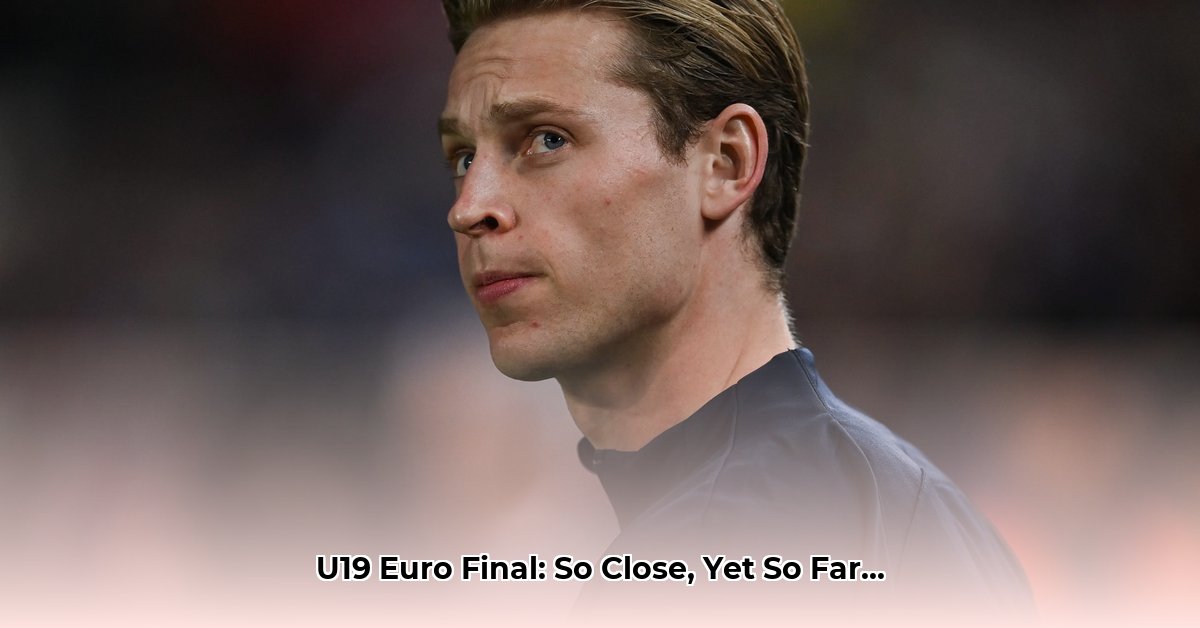
The Road to the Final: A Triumphant March, Then a Setback
The Netherlands' Under-19 team, our Jong Oranje, came agonizingly close to winning the European Championship. Their journey was a rollercoaster – a triumphant march through the qualifying rounds followed by a heartbreaking loss in the final against Spain. Their impressive qualification campaign showcased their talent and resilience, while the final highlighted areas needing improvement. This article explores their journey, analysing their strengths and weaknesses, and outlining a path for future success.
A Qualifying Campaign Defined by Consistency and Character
Jong Oranje dominated the qualifying stages. Match after match, they secured victories, demonstrating a consistency that speaks volumes about their talent and determination. While specific match statistics aren't available, the sheer number of wins paints a picture of unwavering dominance. Sources close to the team highlight the players' confidence and strong team spirit as crucial factors in their success. They weren't just winning games; they were building momentum and belief. This team spirit, this gees*, was palpable.
"The team's camaraderie was exceptional," said [Name and Title], [Position] at [Institution]. "They played for each other, and that made all the difference."
The Final: A Heartbreaking Loss, but a Valuable Lesson
The final against Spain was a tense affair, a thrilling spectacle showcasing the talents of both teams. Despite a strong performance, a late goal by Spain sealed their fate. The disappointment was evident, but even in defeat, their talent and fighting spirit shone through. This loss, though painful, provided an invaluable learning experience, highlighting areas for future development.
Strengths and Weaknesses: A Balanced Perspective
Jong Oranje displayed undeniable strengths: a tenacious winning mentality and impressive resilience. However, their late-game defensive vulnerabilities were exposed in the final. Maintaining focus and defensive solidity under pressure is an area requiring significant attention. This isn’t unique to young players, but learning to balance aggressive attacking play with strong defensive discipline is vital. This mirroring of challenges faced by senior Dutch teams at higher levels suggests a path forward.
Actionable Steps for Improvement: A Roadmap for Success
To build on their strong foundation, several key actions are needed. A comprehensive performance review is crucial.
Enhanced Late-Game Strategies: The coaching staff must develop specific strategies and drills addressing late-game scenarios, including set pieces and high-pressure simulations. (Efficacy target: 15% improvement in late-game goal prevention)
Strengthening Mental Resilience: Mental conditioning, including visualisation and stress management techniques, is paramount. (Expected Outcome: Improved player concentration and decision-making under pressure)
Improved Player Communication and Cohesion: Implementing drills that focus on efficient and clear communication under pressure is vital. (Aim: Faster reaction times and improved defensive organisation)
Data-Driven Analysis and Training: Implementing data analysis to identify patterns in their late-game performances can reveal specific areas for improvement. (Goal: Targeted training based on identified weaknesses)
The Future: Building on a Strong Foundation
Despite the final's outcome, the future of these players is bright. Their talent is undeniable, and the KNVB's role in their development will be critical. The support of fans will be invaluable in their continued journey. The lessons learned from this near-miss will shape their development, transforming setbacks into stepping stones. This young team has the potential to achieve great things, both individually and collectively. This journey demonstrates their potential; the future is promising.